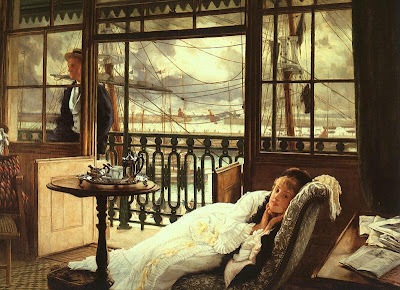 [Image: ‘A Passing Storm’ by James Tissot]
[Image: ‘A Passing Storm’ by James Tissot]How she would have loved
A party to-day! -
Bright-hatted and gloved,
With table and tray
And chairs on the lawn
Her smiles would have shone
With welcomings . . . But
She is shut, she is shut
From friendship's spell
In the jailing shell
Of her tiny cell.
Or she would have reigned
At a dinner to-night
With ardours unfeigned,
And a generous delight;
All in her abode
She'd have freely bestowed
On her guests . . . But alas,
She is shut under grass
Where no cups flow,
Powerless to know
That it might be so.
And she would have sought
With a child's eager glance
The shy snowdrops brought
By the new year's advance,
And peered in the rime
Of Candlemas-time
For crocuses . . . chanced
It that she were not tranced
From sights she loved best;
Wholly possessed
By an infinite rest!
And we are here staying
Amid these stale things
Who care not for gaying,
And those junketings
That used so to joy her,
And never to cloy her
As us they cloy! . . . But
She is shut, she is shut
From the cheer of them, dead
To all done and said
In a yew-arched bed.






